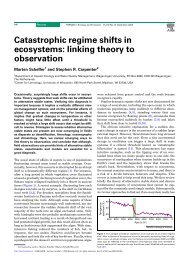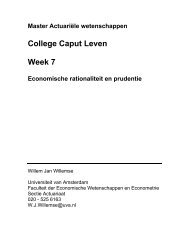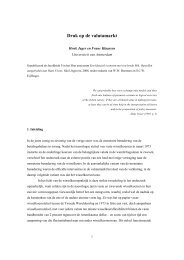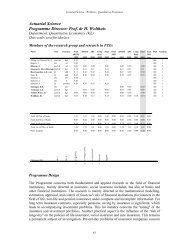How Do Corporate Venture Capitalists Create Value for ...
How Do Corporate Venture Capitalists Create Value for ...
How Do Corporate Venture Capitalists Create Value for ...
Create successful ePaper yourself
Turn your PDF publications into a flip-book with our unique Google optimized e-Paper software.
documented that IVCs are able to create value <strong>for</strong> entrepreneurial firms, <strong>for</strong> example, by<br />
“professionalizing” firms management. On the one hand, specialization by IVCs in making investments in<br />
certain industries may help them develop contracts superior to that of CVCs in the product market (e.g.,<br />
with suppliers and intermediaries) which may be beneficial to entrepreneurial firms backed by them. On<br />
the other hand, the effect of the superior industry expertise of CVC -parent may outweigh the effect of<br />
such industry contacts, allowing CVCs to create greater product market value <strong>for</strong> entrepreneurial firms<br />
backed by them. Such differences in value creation may potentially be reflected in differences in post-IPO<br />
operating per<strong>for</strong>mance <strong>for</strong> CVC and IVC backed firms.<br />
Third, CVCs and IVCs may have different abilities to help portfolio firms access the capital markets,<br />
and the terms under which they access these markets. One the one hand, IVCs, being more frequent<br />
players in the IPO market, can be expected to have stronger relationships with top-tier investment banks,<br />
institutional investors, and financial analysts which may allow them to better communicate firm value to<br />
the capital market. On the other hand, backing by a corporate parent may convey a credible signal to the<br />
financial market about the future prospects of the entrepreneurial firm. Such differences between CVCs<br />
and IVCs may translate into different probabilities of a successful exit <strong>for</strong> CVC and IVC backed firms,<br />
and to different proportions of these kinds of exits. These differences may also result in systematic<br />
differences in the IPO market valuation between CVC-backed and IVC-backed firms. 3<br />
In this paper, we make use of data regarding a large sample of CVC and IVC backed firms to<br />
identify some of the aspects of value creation <strong>for</strong> entrepreneurial firms by corporate venture capitalists<br />
discussed above. Our dataset consists of round by round financing data starting with the very first<br />
investment made by venture capitalists in a private firm, extending through the firm’s IPO stage, and<br />
ending with post-IPO operating per<strong>for</strong>mance and financial market data <strong>for</strong> five years subsequent to the<br />
IPO. Our data set contains not only the characteristics of entrepreneurial firms, but also various aspects of<br />
the CVCs and IVCs investing in those firms.<br />
3 Of course, these differences in exit probabilities and market valuations may also reflect differences in the kinds of firms<br />
invested in by CVCs and IVCs, and differences in the product market value created by these two kinds of intermediaries.<br />
3
















